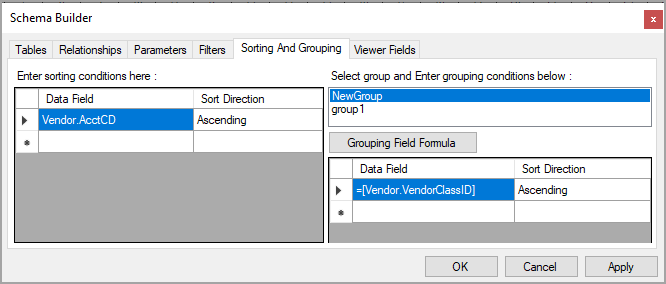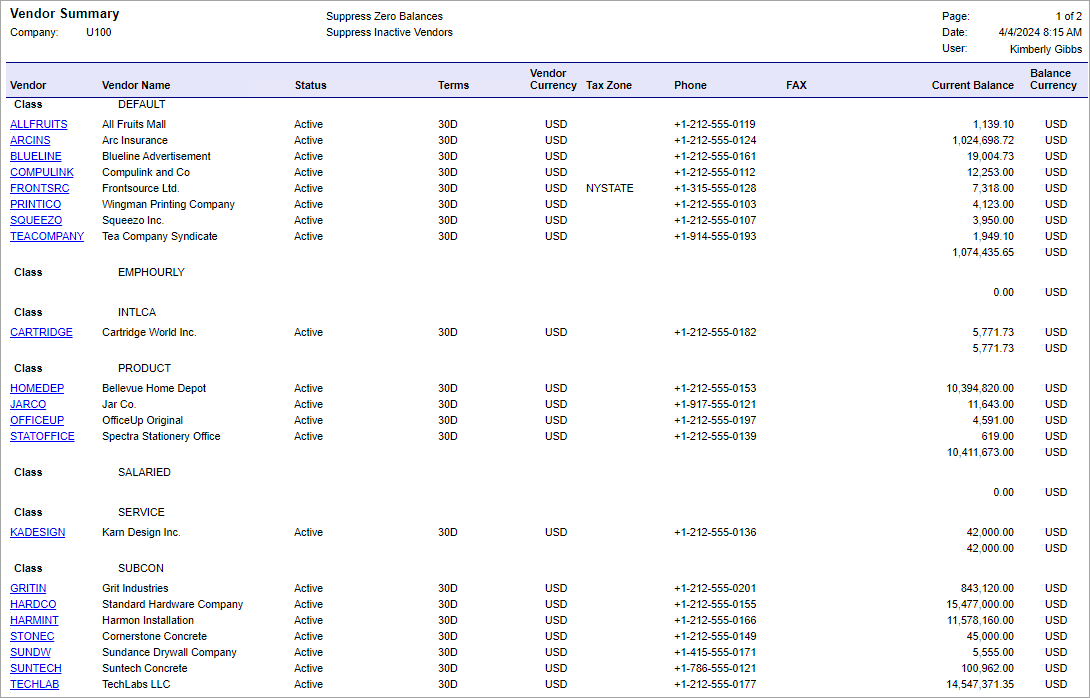Data Sorting and Grouping: To Specify a Data Group in a Report
In the following activity, you will specify a data group in a report.
Story
Suppose that you are a technical specialist in your company who is working on customizations. A sales manager of your company has requested a report that displays data about vendors. You have offered the predefined Vendor Summary (AP655000) report, but the sales manager wants the data to be grouped by vendor class. The sales manager has also asked you to display the total balance for each group. You will create the requested report by using a copy of the Vendor Summary report.
Process Overview
In the Report Designer, you will open the AP6550C1.RPX report, which is a copy of the Vendor Summary (AP655000) report, and add a new group. You will specify a grouping condition and other properties for the new group. You will then modify the report layout and place necessary elements in the new group. Then in the Schema Builder, on the Sorting and Grouping tab, you will review the changes that you have made on the Properties tab of the Properties pane.
System Preparation
Before you perform the steps of this activity, make sure that the following tasks have been performed:
- You have installed the MYOB Acumatica Report Designer, as described in Report Designer: To Install the MYOB Acumatica Report Designer.
- You have installed an MYOB Acumatica instance with the U100 dataset, or a system administrator has performed this task for you.
- You have signed in to MYOB Acumatica as the system administrator by using the gibbs username and the
123 password.Tip:The gibbs user is assigned the Administrator role and the Report Designer role. Thus, this user has sufficient access rights to manage system configuration and to preview, save, and publish reports.
Also, to prepare for use the file that is intended for this activity, do the following:
- Download the AP6550C1.rpx file.
- Open the downloaded file in the Report Designer.
- On the Report Designer menu bar, select , which opens the Save Report on Server dialog box.
- In the dialog box, specify the connection string and sign-in credentials of your
MYOB Acumatica instance, type AP6550C1 as the report name, and click
OK.
The report is saved on the server.
Step 1: Creating a Group in the Report
To create the group in the AP6550C1 report, perform the following steps:
- In the Report Designer, make sure that the AP6550C1 report (which you have saved to the server) is open.
- In the top left corner of the Design pane, click the
icon to select the whole report as an object.
- On the Properties tab of the Properties pane, in the property, click the More button.
- In the Group Collection Editor, which opens, in the
Members pane on the left, click
Add.
A new group with the default
group2name is added and displayed in the Members pane. - Click OK to save the new group and close the Group Collection Editor.
On the report layout, notice that the new group is placed inside the existing
group1.
Step 2: Specifying the Properties of the Group
To specify the group properties, while you are still working with the AP6550C1 report in the Report Designer, do the following:
- In the top left corner of the Report Designer screen, click the
icon to select the whole report as an object.
- On the Properties tab of the Properties pane, in the property, click the More button.
- In the Group Collection Editor, which opens, in the
Members pane, select
group2. - To the right of the Members pane, click the button with
the arrow pointing upward to place
group2at the top of the list.The order of the groups in the Group Collection Editor defines the order of groups in the report.
- In the group2 properties pane on the right side of the Group Collection Editor, in the property, type NewGroup.
- Select the property, and click the More button.
- In the GroupExp Collection Editor, which opens, in the Members pane, click Add.
- In the PX.Reports.GroupExp properties pane, in the property, type Vendor.VendorClassID to
specify the grouping condition based on the class of a vendor.Tip:By clicking the More button to the right of the collection, you can invoke the Expression Editor. In the left pane, you can select the necessary field from the list.
Notice that the property has the Ascending value, which means that by default, the data in the group is sorted in ascending order.
- Click OK to save your changes and close the GroupExp Collection Editor.
- Click OK to close the Group Collection Editor.
Step 3: Placing Elements in the New Group
To place elements in the new group, while you are still working with the AP6550C1 report in the Report Designer, do the following:
- In the Design pane of Report Designer, in the
pageHeaderSection2section, select the text box with theClassvalue and move it to thegroupHeaderSection2 (Header of NewGroup)section (to the left). - In the
groupHeaderSection1 (Header of group1)section, select the text box with the=[Vendor.VendorClassID]value, and move it to thegroupHeaderSection2 (Header of NewGroup)section, to the right of the text box with theClassvalue.Tip:If values are not displayed in the text boxes, you can enlarge the height of the text boxes. Alternatively, you can view values in the property of the text boxes. - Adjust the height of the
groupHeaderSection2 (Header of NewGroup)section to be the same as the height of the text boxes in the section.Tip:You can also adjust the height of thegroupHeaderSection2 (Header of NewGroup)section on the Properties tab of the Properties pane. Select groupHeaderSection2 (Header of NewGroup), and for the property, type the value as follows: 20px. - In the
groupHeaderSection1 (Header of group1)section, copy the text box with the following value:=sum([APHistory.FinYtdBalance])(this is the second element from the right). Paste the text box in thegroupFooterSection2 (Footer of NewGroup)section, in the column with theCurrent Balancetitle (seepageHeaderSection2). This element will display the total balance for the members of theNewGroupgroup. - In the
groupHeaderSection1 (Header of group1)section, copy the text box with the following value:=[BAccount.BaseCuryID](this is the rightmost element). Paste the text box in thegroupFooterSection2 (Footer of NewGroup)section, in the column with theBalance Currencytitle (seepageHeaderSection2). This element will display the currency name of the total balance for the members of theNewGroupgroup. - Adjust the height of the
groupFooterSection2 (Footer of NewGroup)section to be the same as the height of the text boxes in the section. - On the Report Designer window toolbar, click Save.
- Click the Preview tab to preview the report.
Make sure that the data of one group is displayed.
Step 4: Reviewing the Sorting and Grouping Settings in the Schema Builder
While you are still working with the AP6550C1 report in the Report Designer, in the Report Designer, click . In the Schema Builder, which opens, go to the Sorting and Grouping tab. Make sure that the settings on this tab are the same as those that you have specified in the Properties pane of the Report Designer. The settings are shown in the following screenshot.

Step 5: Viewing the Report
In MYOB Acumatica, open the S150 Vendor Summary (AP6550C1) report form by searching for its identifier.
On the report form toolbar, click Run Report. Notice that the data in the report is grouped by vendor class and that a total balance is displayed for each class. The following screenshot shows the report.

